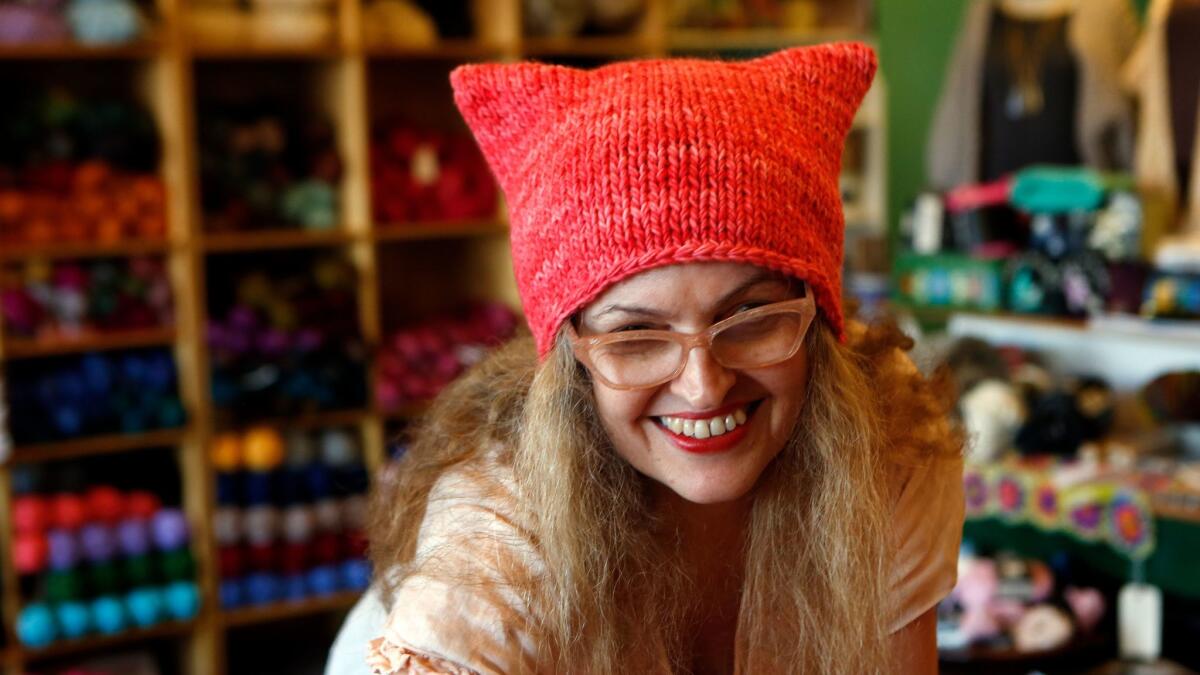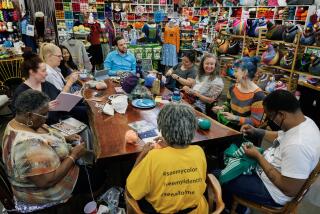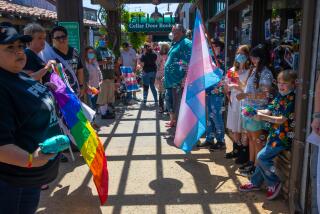The store where the pink ‘pussyhat’ began is being pushed out of Atwater Village by rising rents

Every now and then, people drop by the Little Knittery in Atwater Village to catch a glimpse of where it all began.
It was here that two young women partnered with shop owner Kat Coyle in November to create the “pussyhat,” the iconic pink cap worn by thousands of protesters at the women’s march.
And it was here that dozens of women crowded around Coyle’s knitting table for weeks, using her pattern — a simple cap with cat ears — to make hundreds of hats for a movement that went global and brought solace to many who were crestfallen by the outcome of the presidential election.
“The Little Knittery is a very special place,” said Jayna Zweiman, co-creator of the “pussyhat project.” “It’s become a cultural fixture.”
So it was not easy for Coyle to tell customers in March that she was leaving the neighborhood. Her lease was not renewed and the space, from what she knows, is being turned into a cafe or eatery.
Coyle was devastated at first. In five years, she’s built a faithful clientele of knitters who buy her colorful yarn, looms and needles and take part in her knitting, crochet and macrame classes. They gather around her table to chat and commiserate about politics and art.
Coyle was still recovering from the pussyhat whirlwind when her landlord told her she would need to relocate.
Glendale Boulevard, the street where the Little Knittery is located, has transformed in the last five years as Atwater Village has become more upscale.
Coyle saw tenant after tenant in her building leave in recent years — the water store became a home decor boutique, the insurance business became a solar power dealer and the dry cleaners is now a fine dining restaurant.
“I don’t know why I was so shocked,” Coyle said.
“Because hope reigns eternal,” said Edna Hart, who works at the shop.
At the end of June, Coyle plans to move the Little Knittery to Los Feliz.
The new location is going to add 15 minutes to Sophia Bliziotis’ drive, but like many customers, she said she will remain loyal to the yarn shop. And she will take her pussyhat” memories with her.
“That little spot is special, but I think the locus of the movement is Kat and her partners and their political activism,” Bliziotis said. “They gave me and countless others a way to address our anxiety after the election in a very concrete way.”
When Coyle talks about the pussyhat project, she does so with a sense of awe.
“It’s crazy,” she said. “It’s not something you plan for or imagine.”
She said after the election, many of her customers were distraught. Two young women, Krista Suh and Zweiman, approached her about making a hat that celebrated femininity and cleverly pushed back on President Trump’s vulgar statements about grabbing women’s genitals.
“They wanted something really easy to make,” Coyle said.
So she came up with a cap in the shape of a rectangle that when worn, created cat ears.
The idea was that the hats would be handmade and donated to the thousands of women attending the march. By December, the project spread nationwide. Tens of thousands of hats were made. Those who couldn’t knit donated yarn and materials.
“The whole country ran out of pink yarn,” Coyle said. “You couldn’t get it from any supplier.”
The Little Knittery was packed for weeks with knitters, heartened by the fact that they were creating their pieces at the epicenter of the movement.
These days, things are more quiet at the shop. Only one pussyhat is on display near the register. It’s knitted out of “Kat Pink,” a yarn a supplier named after Coyle. The piece is not for sale.
In fact, you can’t buy a pussyhat at the Little Knittery. If you want one, Coyle asks for your contact information and she gives you a ring when and if a cap is donated to the shop.
Making money was never part of the movement, after all.
“That’s not my style,” Coyle said.
Besides an occasional pink hat, fans send the shopkeeper all sorts of gifts — tributes to the hat she designed. She gets knitted dolls wearing caps from Nebraska and framed art of the cap from Vermont.
“Not a week goes that someone doesn’t come by here to say thank you,” Hart said.
More to Read
Sign up for Essential California
The most important California stories and recommendations in your inbox every morning.
You may occasionally receive promotional content from the Los Angeles Times.











